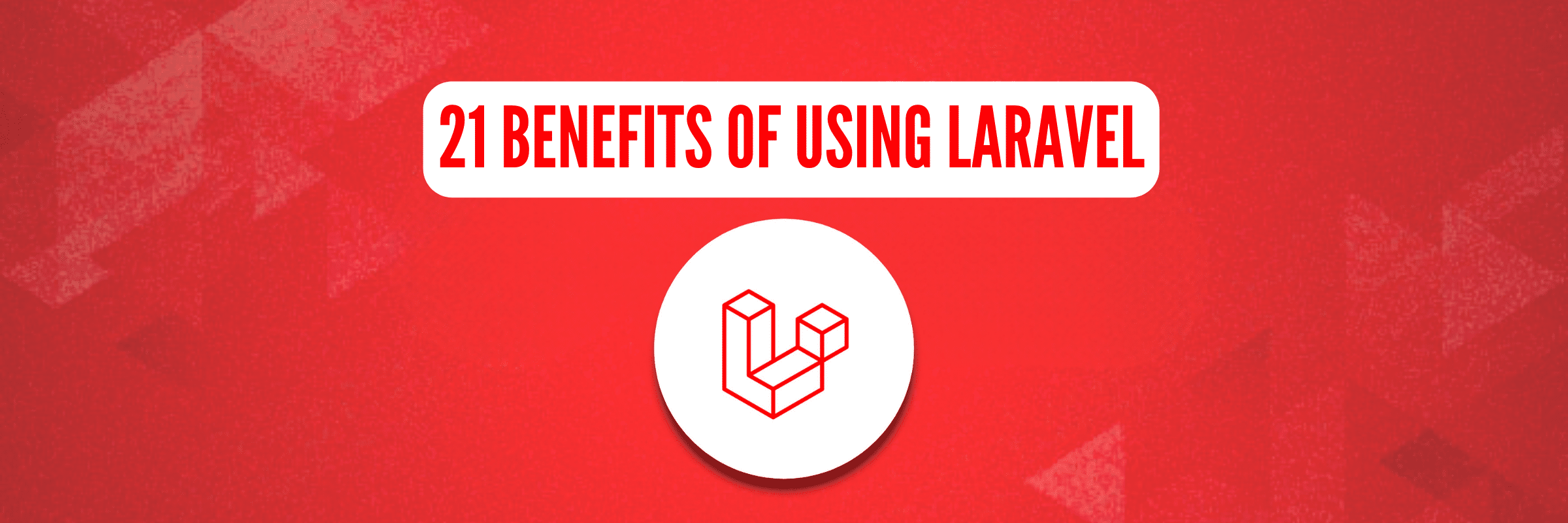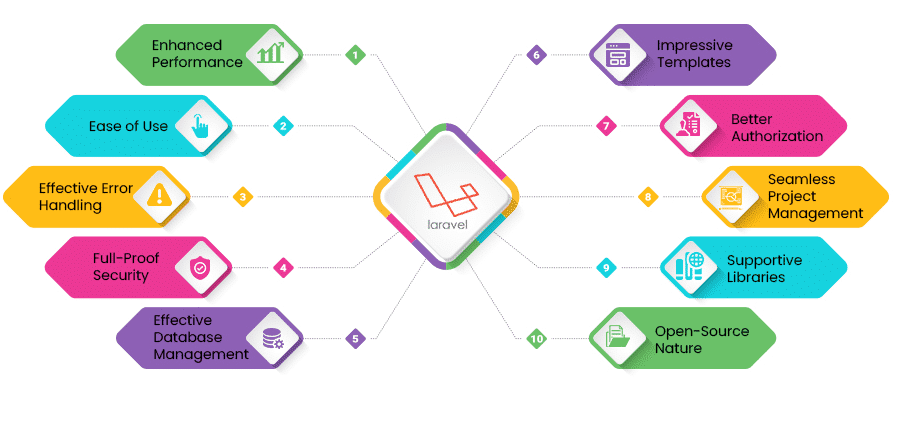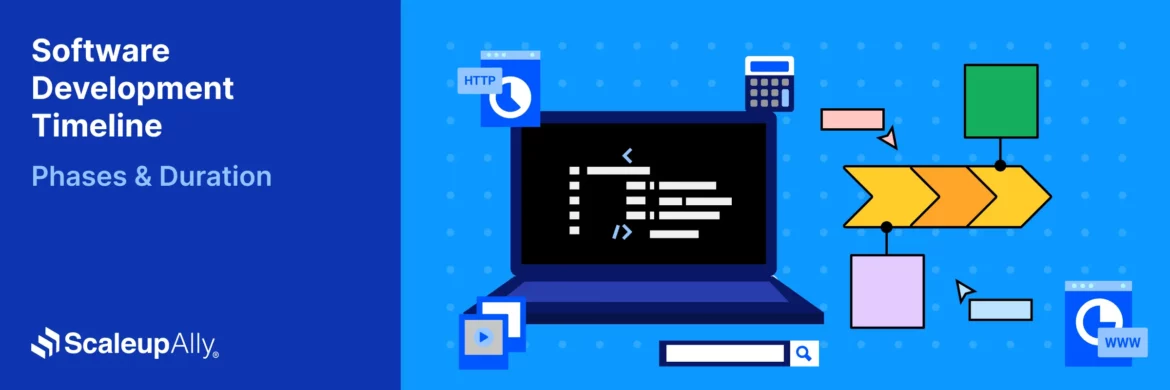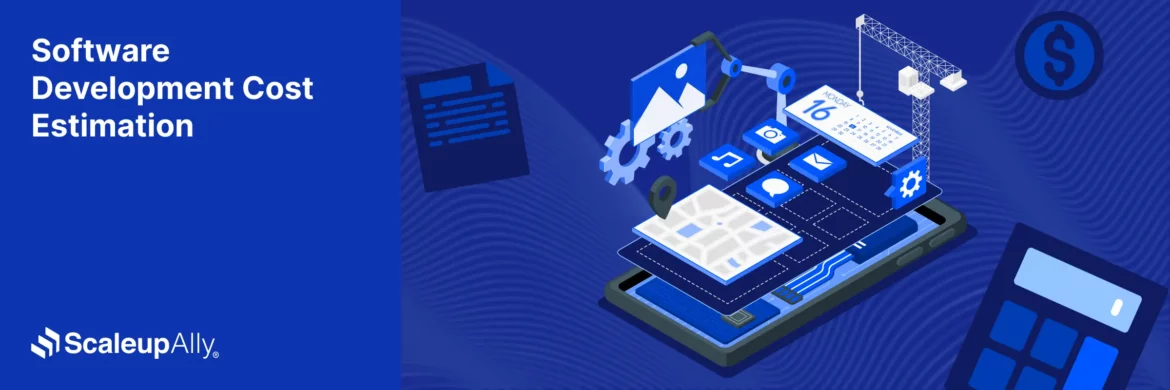
21 Benefits of Using Laravel
Suprabhat Sen | October 21, 2023 , 12 min read
Table Of Content
Selecting the ideal technology stack plays a crucial role in the successful creation of efficient web applications. Amidst the abundance of available frameworks, Laravel, an open-source PHP framework, has witnessed remarkable growth in recent years.
Its surge in popularity can be attributed to its elegant architecture, scalability, and robustness. At present, Laravel fuels an impressive number of more than 721,395 live websites.
In the year 2023, Laravel development remains a standout choice for PHP framework development, particularly in the realm of web development. Its remarkable rise and widespread acclaim have solidified its position as the preferred option for developers and businesses seeking robust solutions in today’s rapidly evolving digital landscape.
In this article, we will explore the 21 key advantages of choosing Laravel as your framework for upcoming projects.
Key Takeaways
- Simplified Development: Laravel’s elegant syntax and pre-built components accelerate development.
- Robust Security: Laravel has built-in security features to protect against common vulnerabilities.
- Scalability: Laravel can handle both small and large-scale projects with ease.
- Cost-Effective: Reduces development time and costs with efficient tools and features.
- Cross-Platform Compatibility: Runs smoothly on various operating systems and web servers.
Why is Laravel Popular?
Before delving into the benefits of Laravel, it’s essential to understand why this framework has become so popular among developers worldwide.
Laravel stands out by offering a comprehensive set of features that simplify and streamline the web development process.
It adheres to the Model-View-Controller (MVC) architectural pattern, a paradigm that segregates an application’s logic, presentation, and data layers. This segregation results in better code organization and maintainability.
Moreover, Laravel boasts a thriving and dynamic community of developers who contribute to its growth through regular updates, tutorials, and robust support.

21 Benefits of Using Laravel
Now that we have an understanding of why Laravel is so popular, let us explore the benefits of Laravel framework:
1. Increased Development Speed
Laravel’s elegant syntax and intuitive structure empower developers to write code swiftly and efficiently. It offers an array of pre-built components and libraries, thereby saving developers significant time and effort. With Laravel, you can rapidly develop and deploy robust web applications, significantly reducing time-to-market.
2. Simplified Routing and URL Configuration
Laravel’s routing engine simplifies the definition of application routes, making it easy to handle incoming requests and generate URLs. This enables route parameter binding, middleware injection, and grouping related routes, ensuring a clean and organized approach to defining application endpoints.
3. Efficient Database Abstraction and Query Building
Laravel’s Eloquent ORM (Object-Relational Mapping) provides a simple and expressive way to interact with databases. Eloquent introduces a “Model” for each database table, encapsulating the logic for querying and modifying data. This powerful ORM eliminates the need for complex SQL queries, resulting in cleaner and more maintainable code.
4. Built-in Authentication and Authorization System
Laravel features a robust authentication system that simplifies user authentication and authorization. It comes with pre-built controllers, views, and routes for common authentication tasks like user registration, login, and password reset. Laravel’s authentication system is highly customizable, enabling developers to tailor it to specific project requirements.
5. Seamless Integration with Caching Mechanisms
Laravel offers built-in support for caching, allowing the storage of frequently accessed data for quicker retrieval. Various caching drivers, including file, database, and Redis, are supported. These caching mechanisms significantly enhance web application performance, especially when dealing with resource-intensive database operations.
6. Simplified Error and Exception Handling
Error and exception handling are essential aspects of any web application. Laravel simplifies this process by providing a built-in mechanism for handling errors and exceptions. It offers a structured way to manage exceptions and display error messages gracefully, aiding in the identification and resolution of potential issues.
7. Enhanced Security Features
Security is a paramount concern in web development, and Laravel takes it seriously. It offers numerous features and tools to bolster application security, protecting against common vulnerabilities such as cross-site scripting (XSS), cross-site request forgery (CSRF), and SQL injection. Laravel also incorporates built-in rate limiting to shield against DDoS attacks.
8. Automated Testing Made Easy
Laravel comes equipped with built-in testing features, simplifying the process of writing unit and feature tests. It seamlessly integrates with PHPUnit, a popular testing framework for PHP. Automated testing in Laravel enables early detection and resolution of bugs, ensuring more stable and reliable applications.
9. Background Job Processing
Some web applications necessitate time-consuming tasks that should not impact the user experience. Laravel’s queueing system enables the offloading of these tasks to background jobs, ensuring application responsiveness. Laravel supports multiple queue backends, including Redis, Amazon SQS, and databases, offering flexibility and scalability in handling queued jobs.
10. Extensive Package Ecosystem
Laravel benefits from a vast and active community of developers who contribute to an extensive package ecosystem. These packages cover a wide range of functionalities, from authentication and authorization to payment processing and social media integration. Leveraging these packages can save you development time and effort, allowing you to focus on the core features of your application.
11. Powerful Artisan CLI
Laravel’s command-line interface (CLI) tool, Artisan, offers a diverse range of commands to streamline the development process. With Artisan, you can generate boilerplate code, run database migrations, clear the cache, and perform various other tasks with just a few simple commands. It simplifies repetitive tasks and enhances developer productivity.
12. Excellent Documentation and Community Support
Laravel boasts comprehensive and well-organized documentation, facilitating the onboarding of developers to the framework. Moreover, the Laravel community is highly active and supportive, with numerous forums, tutorials, and resources available for developers to seek assistance and guidance. This wealth of community support ensures that you can find answers to your questions and learn from experienced developers.
13. Scalability and Performance Optimization
Laravel’s modular structure and scalability render it suitable for projects of all sizes, whether you’re building a small business website or a large enterprise application. Additionally, Laravel offers performance optimization features, including caching, query optimization, and database indexing, guaranteeing optimal application performance.
14. Seamless Integration with Front-end Frameworks
Another advantage of Laravel is that it harmonizes well with popular front-end frameworks like Vue.js, React, and Angular. It provides tools and libraries that streamline the integration process, facilitating the development of modern and interactive user interfaces. Laravel’s API-centric architecture facilitates seamless communication between the front-end and back-end, facilitating the development of single-page applications (SPAs) and progressive web apps (PWAs).
15. Continuous Improvement and Future-Proofing
Laravel benefits from a dedicated team of developers who consistently release updates and improvements to the framework. These updates introduce new features and enhancements while ensuring that Laravel remains aligned with the latest PHP versions and industry best practices. By choosing Laravel, you’re investing in a framework that continuously evolves, future-proofing your applications.
16. Cost-Effective Development
Laravel’s extensive feature set and ease of use contribute to cost-effective development. Its rapid development capabilities and code reusability result in reduced development time and effort. Additionally, Laravel’s modular architecture simplifies application maintenance and updates, reducing long-term maintenance costs. With Laravel, you can maximize your development budget and achieve a higher return on investment.
17. Flexible and Customizable
Laravel’s flexibility empowers developers to tailor the framework to specific project requirements. It offers a wide array of configuration options, allowing customization of various aspects of your application, including database connections, caching mechanisms, and logging. Laravel’s modular structure further enables seamless integration with third-party libraries and components, granting the flexibility to select the tools that best suit your project.
18. Community and Job Market
Being one of the most popular PHP frameworks, Laravel enjoys a thriving community and a vast job market. Becoming part of the Laravel community offers networking opportunities, knowledge sharing, and collaboration with like-minded developers. Furthermore, Laravel’s widespread adoption by businesses ensures a strong demand for Laravel developers, making it a valuable skill in the job market.
Looking to hire professional Laravel developers?
19. Rapid Application Prototyping
Laravel’s simplicity and efficiency render it an excellent choice for rapid application prototyping. With its built-in features and extensive package ecosystem, you can quickly develop a functional prototype of your application, facilitating feedback gathering and idea validation. Laravel’s prototyping capabilities help you iterate and refine your application concept before committing significant time and resources to full-scale development.
20. Cross-Platform Compatibility
Laravel is a cross-platform framework, meaning it can run on various operating systems and web servers. Whether you’re developing on Windows, macOS, or Linux, Laravel offers seamless compatibility. This flexibility allows developers to work in their preferred development environment and deploy applications on different hosting platforms.
21. Long-Term Support (LTS) Releases
Laravel provides Long-Term Support (LTS) releases for those seeking stability and extended support for their applications. LTS releases receive bug fixes and security updates for an extended period, typically three years, providing peace of mind and ensuring that your application remains secure and up-to-date.
Why Does Your Next Project Need Laravel?
Laravel, with its extensive list of benefits, emerges as the ideal framework for your next web development project. Whether you’re embarking on a small business website, a complex enterprise application, or anything in between, Laravel’s simplicity, scalability, and robustness position you to deliver a high-quality and efficient solution.
Its wide range of features, excellent documentation, and supportive community make it accessible even for developers new to Laravel.
By choosing Laravel, you’re setting yourself up for success and ensuring a smooth and enjoyable development experience.
With Laravel, you can:
- Boost Development Efficiency: Laravel’s elegant syntax and pre-built components save time, reducing time-to-market.
- Enhance Security: Its built-in security features protect against common vulnerabilities, ensuring a safe application.
- Future-Proof Your App: Continuous updates and LTS releases keep your application aligned with industry best practices.
- Benefit from a Thriving Community: Join a community of developers and tap into a vast job market.
- Scale Your Project: Laravel’s modular architecture adapts to the specific needs of your project, whether small or large.
Ready to leverage the power of Laravel for your next project? At Scaleupally, we specialize in Laravel development services, offering expert web app development services to craft secure, scalable, and high-performance web applications. Let us help you turn your vision into reality with the unparalleled advantages of Laravel. Get started today!
Conclusion
Laravel, with its numerous benefits and features, is a powerful PHP framework that offers an efficient and enjoyable web development experience. Whether you’re a seasoned developer or just starting your coding journey, Laravel’s simplicity, scalability, and robustness make it an ideal framework for a wide range of projects.
By leveraging Laravel’s extensive feature set, you can deliver high-quality web applications that are secure, performant, and future-proof.
So, why wait?
Choose Laravel for your next project and experience the unparalleled advantages it brings to the table.
Frequently Asked Questions
Q: Is Laravel suitable for small-scale projects?
Yes, Laravel is suitable for projects of all sizes. Its modular structure and scalability make it adaptable to the specific needs of small-scale projects.
Q: Can Laravel be integrated with existing applications?
Absolutely, Laravel can be seamlessly integrated with existing applications. Its modular architecture allows for the easy integration of specific components and functionalities.
Q: Is Laravel suitable for e-commerce applications?
Yes, Laravel is an excellent choice for developing e-commerce applications due to its robustness, security features, and an extensive package ecosystem.
Q: Does Laravel have good documentation?
Yes, Laravel has comprehensive and well-organized documentation, making it easy for developers to learn and use the framework effectively.
Q: Is Laravel suitable for beginners?
Yes, Laravel is beginner-friendly thanks to its elegant syntax, intuitive structure, and extensive community support. Developers new to Laravel can quickly get up to speed and start building applications.
Related Blogs

Top 20 Emerging Technologies of 2026
Discover the top 20 emerging technologies of 2026. Explore which innovations are driving change across healthcare, finance, manufacturing, and other crucial industries.
ScaleupAlly Team
Dec 16 ,
9 min read

Software Development Timeline: Phases, Duration & Estimation Guide
Understand the software development timeline with phase durations, key factors, hidden delays, and practical methods to estimate project time.
Suprabhat Sen
Nov 29 ,
16 min read

Software Development Cost Estimation Guide: What’s Included & What Affects the Price
Explore software development cost components, major pricing factors, and practical estimation methods to plan your project accurately from start to finish.
Suprabhat Sen
Nov 29 ,
14 min read



